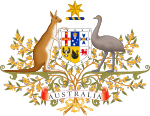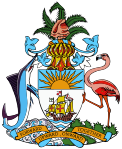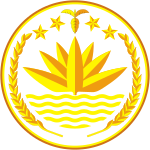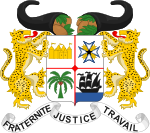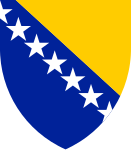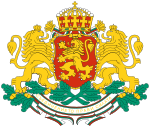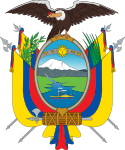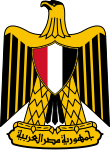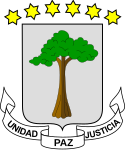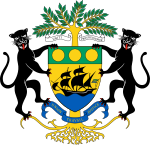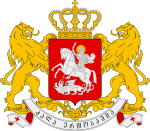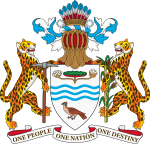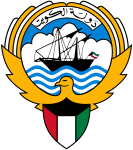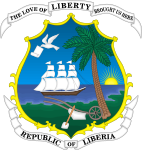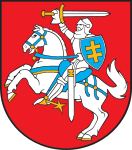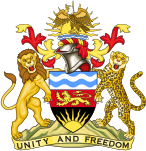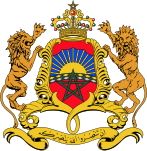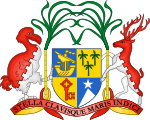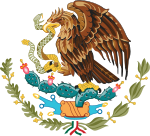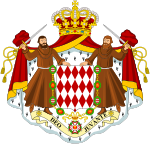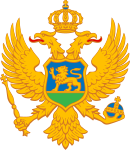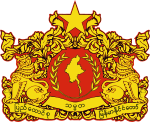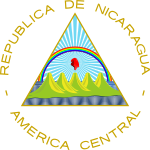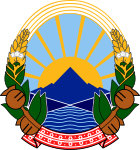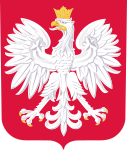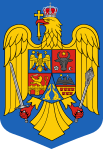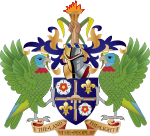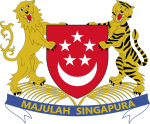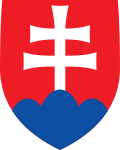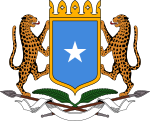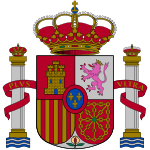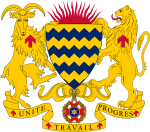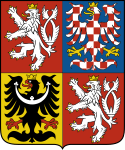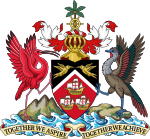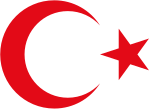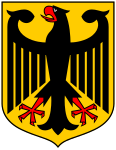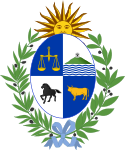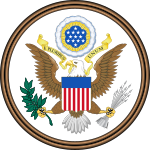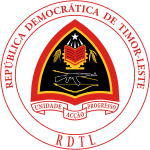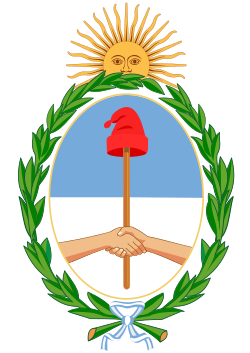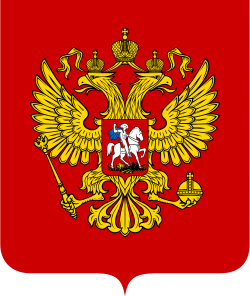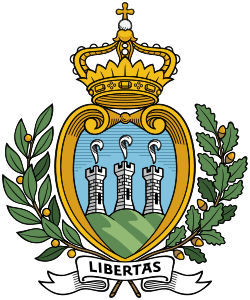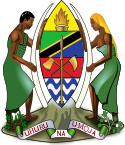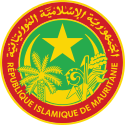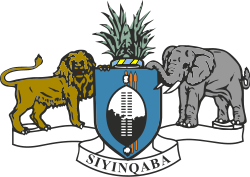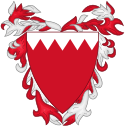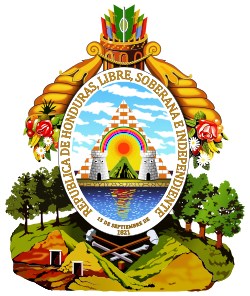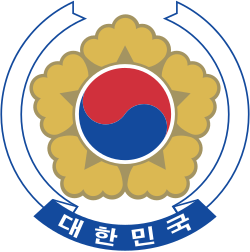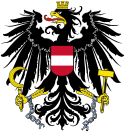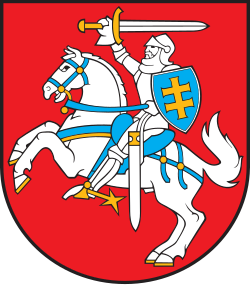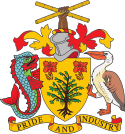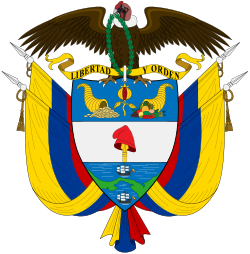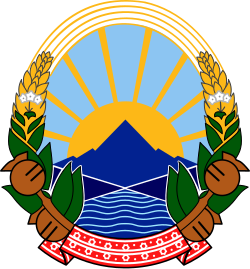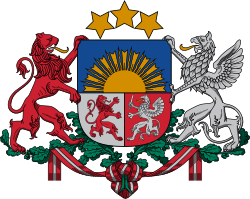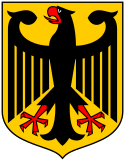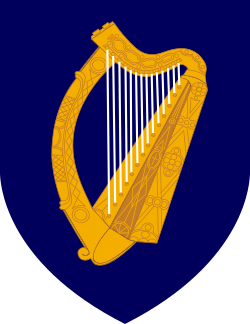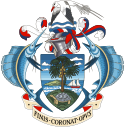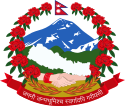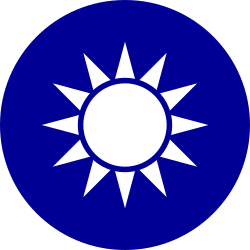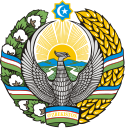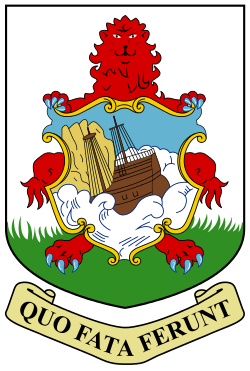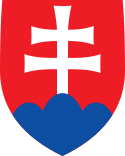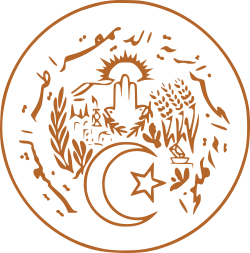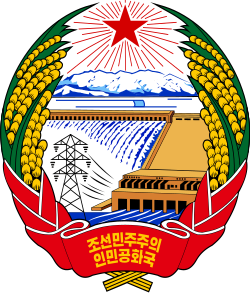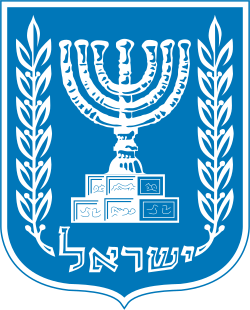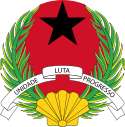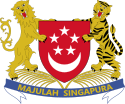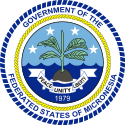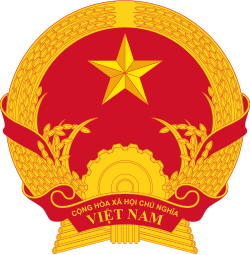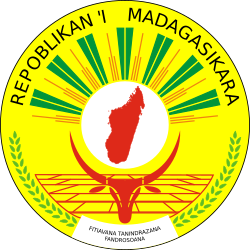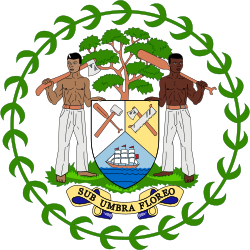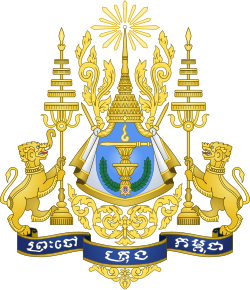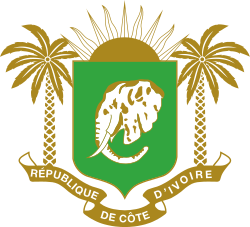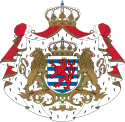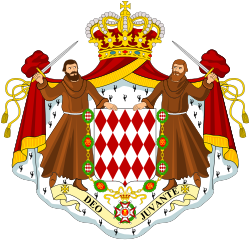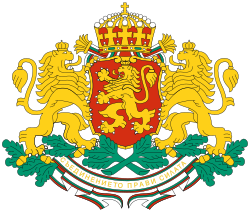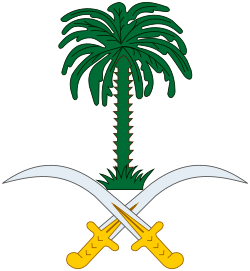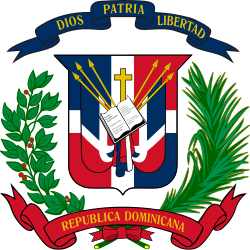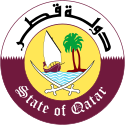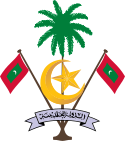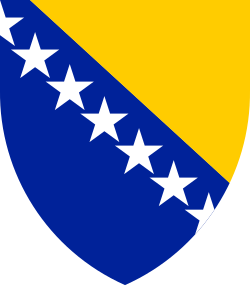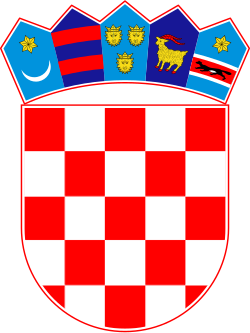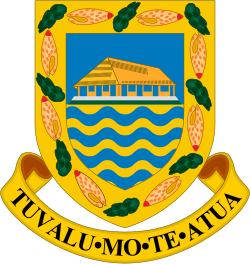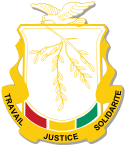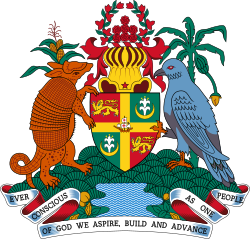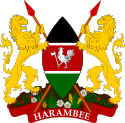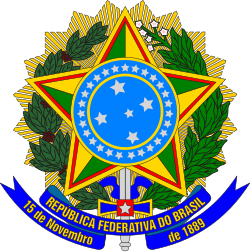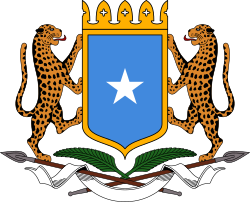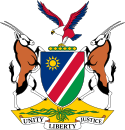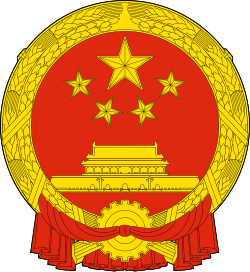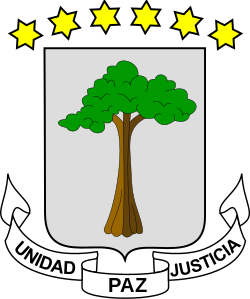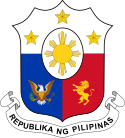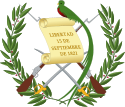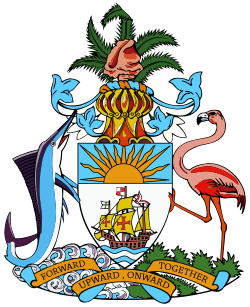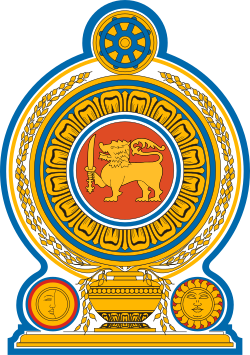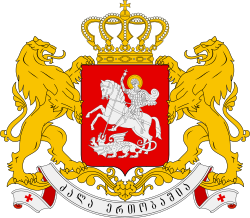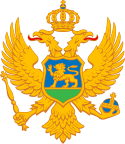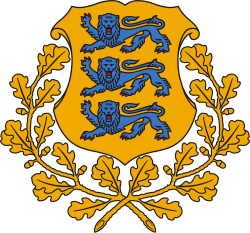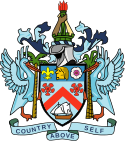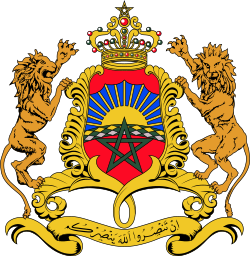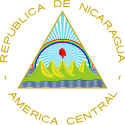Lista över riksvapen
Detta är en lista med bilder på statsvapen för världens länder.
A - C
D - H
I - L
- (c) Xavi Garcia, CC BY-SA 3.0
M - P
Q - S
- (c) Xavi Garcia, CC BY-SA 3.0
- (c) Xavi Garcia, CC BY-SA 3.0
T - Ö
Se även
- Riksvapen
- Heraldik
- Lista över nationalflaggor
- Lista över självständiga stater
- Förenta nationernas medlemsstater
- Lista över stater som saknar fullt internationellt erkännande
- Associerad stat
- Autonom region
- Avhängiga territorier
Referenser
Externa länkar
- Sodipodi: Flags (scalable vector graphic, public domain)
- Flags of the World from CIA
- Flags of the World (FOTW)
Media som används på denna webbplats
Coat of arms of Argentina
Coat of Arms of the Hashemite Kingdom of Jordan during the reign of King Hussein. Inscription on the scroll comprises three phrases. On the right side is “Al Hussein bin Talal bin Aoun” (Aoun is the great grandfather of Al Sharif Al Hussein bin Ali); in the middle is “King of the Hashemite Kingdom of Jordan”; on the left side: “Who seeks support and guidance from God.”
Coat of arms of Malta.
Coat of arms of Portugal
Författare/Upphovsman: Tinynanorobots, Fenn-O-maniC, Licens: CC BY-SA 3.0
Coat of arms of Benin
Författare/Upphovsman: Milenioscuro, Licens: CC BY 3.0
Coat of arms of Chad
Emblem of Bhutan — used by the Parliament of Bhutan, first established in 2007.
Seal of the Republic of the Marshall Islands.
Författare/Upphovsman: FischX, Licens: CC BY-SA 3.0
Coat of arms of Tanzania. The caption reads "Freedom and Unity" in Swahili.
Författare/Upphovsman: Sodacan, Licens: CC BY-SA 3.0
Coat of Arms of the Republic of Trinidad and Tobago
The palm tree at the top of the coat of arms was taken from Tobago’s coat of arms before it was joined in political union with Trinidad. The wreath represents the crown of the monarchy of the United Kingdom, Trinidad and Tobago’s colonizers at the time of independence. The shield has the same colours (black, red, and white) as the nation’s flag and carry the same meaning. The gold ships represent the Santa María, La Niña, and La Pinta: the three ships Christopher Columbus used on his journey to the “New World”. The two birds on the shield are hummingbirds. Trinidad is sometimes referred to as the “Land of the Hummingbird” because more than sixteen different species of hummingbird have been recorded on the island. “Land of the Hummingbird” is also believed to have been the Native Amerindian name for Trinidad. The two larger birds are the Scarlet Ibis (left) and the Cocrico (right), the national birds of Trinidad and Tobago. Below the Scarlet Ibis are three hills, representing the Trinity Hills in southern Trinidad, which, it is believed, convinced Columbus to name the island after the Holy Trinity. The island rising out of the waters beneath the Cocrico represents Tobago. Below these birds is the nation’s motto, "Together We Aspire, Together We Achieve." Adopted in 1962.
Seal of Mauritania
Coat of arms of Eswatini
The coat of arms of Honduras was created on October 3, 1825. Dionisio Herrera, as the Head of State of Honduras, decreed through his initiative, Honduras acquired its own national shield, one which represents Honduran history and the rich variety of national resources that it possesses and which should be protected and conserved. The National Congress thereby declared in its decree #16 and article 142, designated the shield as a national symbol for all uses, in a clear and general manner. The National Congress approved this in Tegucigalpa on January 10, 1935. (http://www.honduras.com/official/)
The National Congress decrees:
Article 1 - The National Coat of Arms that shall be used is an equilateral triangle. On its base is a volcano between two castles, over them is a rainbow and below it [and] behind the volcano a sun rises spreading light. The triangle [is] placed over land which appears to be bathed by both seas [Atlantic and Pacific]. Around it an oval containing in gold lettering: "REPUBLICA DE HONDURAS, LIBRE, SOBERANA E INDEPENDIENTE. 15 DE SEPTIEMBRE DE 1821" [Republic of Honduras, Free, Sovereign and Independent. 15th September 1821] On the top part of the oval there is a quiver full of arrows from which hang horns of plenty joined with a knot resting over a mountain range from which clearly stand three oak trees on the right hand side and three pine trees on the left, and mines, a bar, a drill, a wedge, a sledgehammer and a hammer [all] distributed as appropriate. (http://flagspot.net/flags/hn).html)Coats of Arms of Burkina Faso
Emblem of Azerbaijan
Författare/Upphovsman: Di (they-them), Licens: CC BY-SA 4.0
Royal arms of Denmark from 2024, based on information from https://www.kongehuset.dk/en/the-monarchy-in-denmark/the-royal-symbols/the-royal-coat-of-arms/# (image).
Current (1986) version of the coat of arms of Cameroon, a modified version of the original design adopted 1960...
Författare/Upphovsman: FXXX, Licens: CC BY-SA 3.0
Coat of Arms of Tunisia
Författare/Upphovsman: Simi Tukidia, Licens: CC BY-SA 3.0
This is a vector image of the Fiji Coat of Arms re-created in Adobe Illustrator software
Coat of arms of Austria: Coat of arms of Austria, depicting the more heraldic version of black eagle. (Version with several mistakes in dimensions of and in the shild and other.)
The coat of arms of Lithuania, entitled "Vytis".
Present day version of the coat of arms of Lithuania.
Författare/Upphovsman: Sodacan, Licens: CC BY-SA 4.0
National Emblem of Papua New Guinea (Adopted on 1 July 1971)
| “ | DESCRIPTION OF THE NATIONAL EMBLEM (National Identity Act 1971)
The Papua New Guinea National Emblem is a partiaIIy-stylized representation of the widespread Bird of Paradise Genus paradisaea in display, head turned to its left, seated on the upturned grip of a horizontal Kundu drum with the drum-head to the right side of the bird, from behind which a horizontal ceremonial spear projects with the head to the left of the bird. If coloured proper, the following colours should be used -- BIRD OF PARADISE
SPEAR
KUNDU DRUM
|
” |
Författare/Upphovsman: Neville C. Connell, director of the Barbados Museum, Licens: CC BY-SA 3.0
The Coat of Arms of Barbados.
Arms: Or a bearded Fig Tree eradicated in chief two Red Pride of Barbados Flowers proper.
Crest: On a Wreath Or and Gules A dexter Cubit Arm of a Barbadian erect proper the hand grasping two Sugar Canes in saltire proper.
Supporters: On the sinister (left) side a Dolphinfish and on the dexter (right) side a Pelican proper.
Motto: “Pride and Industry.”Turkey has no official coat of arms, this star and crescent is being used on passports, ID cards, driving licences, embassy signs, seal of the presidential office, seal of the TBMM and the seal of the Ministry of Foreign Affairs.
Emblem of Yemen. From http://www.brandsoftheworld.com/search/93446021/113560.html
Coat of arms of Latvia.
Författare/Upphovsman: extracted from the flag of Brunei, provided at the Open Clip Art website., Licens: CC0
Emblem of Brunei.
Coat of Arms of the Hashemite Kingdom of Jordan during the reign of King Hussein. Inscription on the scroll comprises three phrases. On the right side is “Al Hussein bin Talal bin Aoun” (Aoun is the great grandfather of Al Sharif Al Hussein bin Ali); in the middle is “King of the Hashemite Kingdom of Jordan”; on the left side: “Who seeks support and guidance from God.”
Arms of Ireland. Blazon: Azure, a harp or stringed argent. With 14 strings shown.
The National Emblem of India is derived from the time of the Emperor Ashoka. The emblem is a replica of the Lion of Sarnath, near Varanasi in Uttar Pradesh. The Lion Capital was erected in the third century BC by Emperor Ashoka to mark the spot where Buddha first proclaimed his gospel of peace and emancipation to the four quarters of the universe. The national emblem is thus symbolic of contemporary India’s reaffirmation of its ancient commitment to world peace and goodwill. The four lions(one hidden from view ) – symbolising power, courage and confidence- rest on a circular abacus. The abacus is girded by four smaller animals—Guardians of the four directions: The Lion of the North, The Horse of the West, The Bull of the South and The Elephant of the East. The abacus rests on a lotus in full bloom, exemplifying the fountainhead of life and creative inspiration. The motto 'Satyameva Jayate' inscribed below the emblem in Devanagari script means 'truth alone triumphs'.
Coat of arms of Iceland
National Seal of the Comoros.
Arabic text reads جمهورية القمر المتحدة Jumhuriyat al-Qamar al-Muttaḥidah.
Coat of arms of Seychelles adopted on 18 June 1996.
Heraldic description of the Armorial Bearings of the Republic of the Seychelles:
- ARMS: Azure, a Female Coco de Mer Palm (Lodoicea maldivica) issuant from the base a grassy mount thereon a Giant Tortoise (Testudo gigantea) the whole in front of water rising therefrom to the dexter an Island and sailing thereon a two-masted Schooner in full sail all proper.
- CREST: Upon a wreath Azure, Or, Gules, Argent and Vert above water barry wavy Azure and Argent a White Tailed Tropic Bird (Phaeton lepturus lepturus) volant proper.
- SUPPORTERS: On either side a Sail Fish (Istiophorus gladius) proper
- MOTTO: "FINIS CORONAT OPUS" (can be loosely translated as "The End Crowns the Work".)
Emblem of Laos since 1991. This is/was a work-in-progress of the English Wikipedia Graphics Lab.
Republiken Kinas statsvapen.
Coat of arms of the Republic of Burundi.
Coat of arms of Bermuda
Coat of arms of Slovakia
Coat of arms of the Republic of Serbia
Författare/Upphovsman: Sodacan, Licens: CC BY-SA 3.0
Coat of arms of Vanuatu, adopted 30 July 1980
Logo of the Ministry of Energy and Mining in Algeria
Författare/Upphovsman: Sodacan, Licens: CC BY-SA 3.0
Coat of Arms of the of Uganda
| “ | An achievement was adopted by the National Council, three weeks before the proclamation of independence. On 1 October 1962 it was approved by the Governor and fixed by law on 9 October. The achievement is:
|
” |
Coat of arms of Egypt -- standard pan-Arab "Eagle of Saladin" with shield of vertical tricolor of the national flag, holding a scroll with the words جمهورية مصر العربية (Jumhuriyat Misr al-`Arabiya or "Arab Republic of Egypt").
SVG version of the South Sudan Coat of Arms, drawn from the low-res png version available at this time.
The Coat of arms of the Democratic Republic of the Congo since 2006
Författare/Upphovsman: Sodacan, Licens: CC BY-SA 3.0
Coat of Arms of the Republic of Malawi, adopted upon independence in 1964. A Royal Warrant granted by Queen Elizabeth II, reads:
- Arms: Tierce per fess: 1. Barry wavy of four Azure and Argen; 2. Gules, a lion passant Or; 3. Sable, a rising sun radiant Or.
- Crest: On a steel helmet to the dexter, lambrequined Or and Gules, a rising sun radiant Or, charged with a fish eagle hovering above two waves Azure, proper.
- Supporters: A lion on the dexter and a panther on the sinister proper.
- Compartment: Mount Mlanje proper.
- Motto: UNITY AND FREEDOM, in black lettering on a ribbon Or.
The national coat of arms of Slovenia. Slovenias Coat of Arms defines three stars that represent the Counts of Celje, Triglav mountain and Adriatic sea.
Författare/Upphovsman: DzWiki, Licens: CC BY-SA 3.0
Emblem of Guinea-Bissau
Författare/Upphovsman: unknown, Licens: CC BY-SA 4.0
Coat of arms of Gabon
Författare/Upphovsman: Original design by Nicholas Potin, vectorised by user:Fenn-O-maniC, Licens: CC BY-SA 3.0
Coat of arms of Gambia
Emblem of Vietnam. Blazon: On a roundel Gules, a mullet Or of the field, in base a cogwheel of ten teeth also Or; surrounded by two garbs of rice Or, each of five ears and fifty-four grains, tied by a ribbon Gules fimbriated Or and inscribed with the words CỘNG HOÀ XÃ HỘI CHỦ NGHĨA in chief and VIỆT NAM in base, all letters Or.
Författare/Upphovsman: Sodacan, Licens: CC BY-SA 3.0
Coat of Arms of Guyana
Seal of Madagascar
Star and crescent gold color placed on Libyan passports
Coat of arms of Belize
The Emblem of Turkmenistan with realistic image of the horse (Yanardag with white spots on its legs). This version is used in present on 2012 http://tax.gov.tm/. Colors are in accordance with the Regulations about the State Emblem of Turkmenistan on August 25, 2003, clause 3 (Russian text - http://base.spinform.ru/show_doc.fwx?rgn=25217).
Royal Arms of the Kingdom of Cambodia.
- Depicting: a Golden sword atop two ceremonial bowls, above it is the sacred "Aum", below is a laurel wreath and the Royal Order. The Arms is supported by two creatures, a gajasingha and a singha, they are holding two five-tiered royal umbrellas. Atop the arms is the Royal crown with rays of light emitting from it. Below is a ribbon with the words in Khmer script: ព្រះចៅ ក្រុង កម្ពុជាPreah Chau Krong Kampuchea: "King of the Kingdom of Cambodia".
Författare/Upphovsman: Prez001, Licens: CC BY-SA 3.0
Another variant of the Coat of Arms of Côte d'Ivoire seen in use here: http://www.gouv.ci/Main.php
This version has very stylized trees, and the gold is much darker. Also the gold doesn't extend to the rays of the sun.
I think there are lots of versions going around that is concurrently being used officially, mostly based on which version is readily available at the time an image of the coat of arms is needed.Författare/Upphovsman: en:User:Ssolbergj and authors of source files, Licens: CC BY-SA 4.0
Coat of Arms of the Grand Duchy of Luxembourg - The large coat of arms of the Grand Duchy of Luxembourg. Barry silver and azure ten pieces, a lion rampant gules, crowned, armed and langued gold, forked tail and looped. Stamp: The grand-ducal crown unlined. Supports: Two golden lions and even crowned, contoured head (fussy), armed and langued gules, forked tail and looped. Increased arms ribbon and the cross of the Order of the oak wreath encircling the shield and the whole put on a coat: Gules lined with ermine lined, fringe, tassel and gold-ordinates, summoned to the grand-ducal crown unlined.
Coat of arms of Iraq as adapted to new 2008 form of national flag -- standard pan-Arab "Eagle of Saladin" with shield of the tricolor of national flag (with the "Takbir" الله أكبر in Kufic text, as on the flag), holding a scroll with the words جمهورية العراق; (Jumhuriyat al-`Iraq "The Republic of Iraq").
Författare/Upphovsman: Edem Fiadjoe, Licens: CC BY-SA 4.0
Armoiries du Togo
Författare/Upphovsman:
- Lion héraldique.svg - Bluebear2
- Heraldique meuble lion passant.svg - Rinaldum, S@m, Zigeuner
- Coat of arms of Haiti (1964-1986).svg - Thommy9
- härlett verk: Yuma
free version of the Sierra Leone CoA
Författare/Upphovsman: Diafora, Licens: CC BY-SA 3.0
Coat of Arms of Saint Lucia
| “ | The ROSE which you see on the coat of arms tells us about England. At one time England was our “mother” country because she was in charge of our affairs. The FLEUR-DE-LIS reminds us that we belonged to France as many as seven times. The Bamboo is our national plant, two pieces form the cross of the shield. The little AFRICAN STOOL in the centre is African and reminds us of our ancestors who were shipped from Africa during the slave trade. To light us on our way, we have a TORCH which is held up high. The Saint Lucian Parrot Amazona versicolor is our national bird guards each side of the Coat of Arms. Our Motto “THE LAND, THE PEOPLE, THE LIGHT”, is printed at the bottom of the shield. | ” |
Författare/Upphovsman: Sodacan, Licens: CC BY-SA 3.0
Royal Coat of Arms of the Netherlands
Författare/Upphovsman: unknown, Licens: CC BY-SA 3.0
Coat of arms of Republic of Bulgaria
National Emblem of Thailand, depicting a dancing Garuda with outstretched wings. The Garuda symbolizes the government and people of Thailand, as Lord Vishnu symbolizes King of Thailand.
Emblem of Saudi Arabia
Coat of arms of the Dominican Republic
Emblem of Qatar (1976–2022)
Coat of Arms of the Maldives
Coats of arms of Suriname
State emblem of Indonesia is called Garuda Pancasila. The main part of the coat of arms is the golden mythical bird Garuda with a shield on its chest and a scroll gripped by its leg bears the national motto: "Bhinneka Tunggal Ika", roughly means "Unity in Diversity". The shield's five emblems represent Pancasila, the five principles of Indonesia's national philosophy. The numbers of feathers was meant to symbolize the date of Indonesian Proclamation of Independence; 17 feathers on each wings, 8 tail feathers, 19 upper tail feathers (under the shield, above the tail), and 45 neck feathers; all symbolize 17-8-1945; 17th August 1945. Garuda Pancasila was designed by Sultan Hamid II of Pontianak, and was adopted as national coat of arms on February 11, 1950.
Kroatiens statsvapen
The State Emblem of the Kyrgyz Republic.
Författare/Upphovsman: Denelson83, Licens: CC BY-SA 3.0
Coat of arms of Tuvalu. Manually drawn using an image in the World Flag Database as a reference. The words "Tuvalu mo te atua" are the first line of Tuvalu's national anthem. Translated: "Tuvalu for the Almighty" (see: en:Tuvalu_mo_te_Atua)
Författare/Upphovsman:
- Emblem_of_Kuwait.svg: RoyFocker 12
- derivative work: Pbroks13 (talk)
State emblem of Kuwait, with inscription دولة الكويت dawlat al-kuwayt "State of Kuwait".
Coat of arms of Greece since 7 June 1975.
Coat of Arms of the Republic of Ghana, adopted on 4 March 1957
Författare/Upphovsman: Prez001, Licens: CC BY-SA 3.0
Coat of Arms of St Vincent and the Grenadines.
Författare/Upphovsman: Turn685, Licens: CC BY-SA 3.0
The present coat of arms of Guinea was adopted in 1984 and features a dove with a golden olive branch in its beak over a ribbon with "Work justice solidarity". The arms formerly also included a crossed sword and rifle. Previous arms in 1958 featured a red and yellow shield with a green elephant on it.
Författare/Upphovsman: Pbroks13 (talk), Licens: CC BY-SA 3.0
Coat of arms of Niger
Författare/Upphovsman: Sodacan, Licens: CC BY-SA 4.0
Coat of arms of Grenada, adopted in the summer 1974 following independence.
| “ | Quarterly, a cross Or, 1 & 4: Gules, a lion passant guardant Or, 2 & 4: Vert, a crescent and a lily Or; and in nombril point a picture of the Santa Maria. For a crest a golden helmet guardant, lambrequined Gules and with a wreath Argent and Gules, seven red roses surrounded with a garland of Bougainvillea-flowers. For supporters an armadillo (Tolypeutes tricinctus – Dasypodidæ) on the dexter, supporting a stalk of maize, and a Grenada dove (Leptotila wellsi) on the sinister, supporting a banana tree. On a ribbon an motto: EVER CONSCIOUS OF GOD WE ASPIRE, BUILD AND ADVANCE AS ONE PEOPLE. As a compartment the Mount St. Catherine and the lake Grand Étang. | ” |
Coat of arms of Liechtenstein
Författare/Upphovsman: Josedar, Licens: CC BY-SA 4.0
Coat of arms of São Tomé and Príncipe
Commonwealth Coat of Arms of Australia granted by Royal Warrant signed by King George V on 19 September 1912.
IMPORTANT:This image is an artist's interpretation of the original (1912) official version of the Commonwealth Coat of Arms shown in Commons on the Australian coat of arms page. A variant of the original, with a transparent background, is shown on this page.
| “ | Quarterly of six, the first quarter Argent a Cross Gules charged with a Lion passant guardant between on each limb a Mullet of eight points Or; the second Azure five Mullets, one of eight, two of seven, one of six and one of five points of the first (representing the Constellation of the Southern Cross) ensigned with an Imperial Crown proper; the third of the first a Maltese Cross of the fourth, surmounted by a like Imperial Crown; the fourth of the third, on a Perch wreathed Vert and Gules an Australian Piping Shrike displayed also proper; the fifth also Or a Swan naiant to the sinister Sable; the last of the first, a Lion passant of the second, the whole within a Bordure Ermine; for the Crest on a Wreath Or and Azure A Seven-pointed Star Or, and for Supporters dexter a Kangaroo, sinister an Emu, both proper. | ” |
Författare/Upphovsman: Ysangkok and others, Licens: CC0
Coat of arms of Ecuador
Variant of the State Seal of Myanmar
Current coat of arms of Liberia, adopted 1963
Coat of arms of Lesotho from 2006.
Coat of arms of El Salvador
- The coat of arms has the words (REPÚBLICA DE EL SALVADOR EN LA AMÉRICA CENTRAL) in a bold and Heavy, Sans Serif Boris Black Bloxx typeface, in a golden amber color
- The nacional motto (DIOS UNIÓN LIBERTAD) in bold version of Trajan (typeface), Roman type, Roman square capitals. The letters are colored black within a golden amber scroll.
- The date (15 DE SEPTIEMBRE DE 1821) in bold version of Trajan (typeface), Roman type, Roman square capitals.
National emblem of the People's Republic of China
Coat of arms of Mali
Författare/Upphovsman: Borb, modified by User:Di (they-them), Licens: CC BY-SA 4.0
Coat of arms of Cyprus since 2006
East Timor Coat Of Arms
Stora riksvapnet
Lag (1982:268) om Sveriges riksvapen (riksdagen.se)
| “ | 1 § Sverige har två riksvapen, stora riksvapnet, som också är statschefens personliga vapen, och lilla riksvapnet. Riksvapnen används som symboler för den svenska staten.
2 § Stora riksvapnet utgörs av en blå huvudsköld, kvadrerad genom ett kors av guld med utböjda armar, samt en hjärtsköld som innehåller det kungliga husets dynastivapen.
3 § Lilla riksvapnet består av en med kunglig krona krönt blå sköld med tre öppna kronor av guld, ordnade två över en.
|
” |
Coat of arms of Equatorial Guinea
Sila ʻo Tonga — Coat of arms of the Kingdom of Tonga
Simplified image of arms of Poland; the official arms can be seen at: Coat of arms of Poland-official.png
Författare/Upphovsman: Prez001, Licens: CC BY-SA 3.0
Coat of arms of the Solomon Islands.
Emblem of the United Arab Emirates (from 2008)
Coat of arms of the Philippines
Guatemalas statsvapen
Coat of arms of the Bahamas, mantling doubled argent (white)
National emblem of Sri Lanka
(c) Sodacan, Katepanomegas, CC BY-SA 3.0
Greater coat of arms of the Kingdom of Belgium
Coat of arms of Montenegro (adopted on 13 July 2004)
Författare/Upphovsman: User:Escondites, Licens: CC BY-SA 3.0
Coat of Arms of Mauritius.
Författare/Upphovsman: Simitukidia, Licens: CC BY-SA 3.0
This is a vector image of the Samoa Coat of Arms re-created in Adobe Illustrator software
State emblem of the Islamic Republic of Iran. U+262B, stylized version of Arabic script of Allah (الله, with the central lam shaped to look like a sword.) The emblem is also an overlaid rendering of La Ilaha Illa Allah (There is only one God and that is 'Allah'). The exact shape of the emblem and an algorithmic ruler-and-compass construction is described in the national Iranian standard at IRANIAN ISLAMIC REPUBLIC FLAG, ISIRI 1, 1371, 3rd edition, March 1993 in Persian. The emblem was designed by Hamid Nadimi, and was officially approved by Ayatollah Khomeini on May 9, 1980.
Författare/Upphovsman: Vectorized by Froztbyte, Licens: CC BY-SA 3.0
Coat of arms of Anguilla (adopted on 13 July 2004) - Extracted from Flag of Anguilla.svg
Coat of Arms of Saint Kitts and Nevis since 1983. This is an incorrect version, as the heraldic silver tincture is depicted with a shade of light blue.
Författare/Upphovsman: Sodacan, Licens: CC BY-SA 3.0
Coat of Arms of New Zealand (1956-Present)
- The Coat of Arms depict a shield with four quadrants divided by a central "pale". The first quadrant depicts the four stars on the flag of New Zealand; the second quadrant depicts a golden fleece, representing the nation's farming industry; the third depicts a sheaf of wheat for agriculture; and the fourth quadrant depicts crossed hammers for mining. The central pale depicts three galleys, representing New Zealand's maritime nature and also the Cook Strait. The Dexter supporter is a European woman carrying the flag of New Zealand, while the Sinister supporter is a Maori Warrior holding a Taiaha (Fighting weapon) and wearing a Kaitaka (flax cloak). The Shield is topped by the Crown of St. Edward, the Monarch of New Zealand's Crown. Below is a scroll with "New Zealand" on it, behind which (constituting the "heraldic compartment" on which the supporters stand) are two fern branches.
Författare/Upphovsman: Dessiné par Jérôme BLUM le 5 septembre 2007. Készítette: Jérôme BLUM 2007., Licens: CC BY-SA 2.0 fr
unofficial emblem of the French Republic, created from France coa.png. The only official emblem of France is its tricolour flag.







